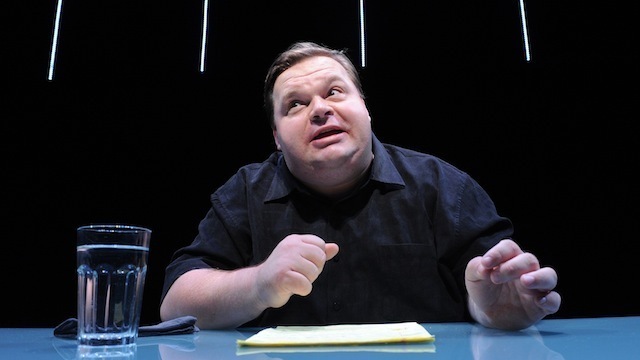
Well-loved radio show This American Life—spawned from station WBEZ right here in Chicago—has some "difficult news" about one its most popular shows, an episode on Apple and labor conditions in China. The episode "contained significant fabrications," writes TAL host Ira Glass today on the show's blog. He is devoting this week's entire episode, called "Retraction," to the story.
The original TAL episode, "Mr. Daisey and the Apple Factory," aired on January 6, 2012, and included portions of the one-man show "The Agony and the Ecstasy of Steve Jobs" by Mike Daisey. (We attended a performance last year.) It proved hugely popular, but recently a reporter for another public radio show tracked down one of the interpreters Daisey used on his own visit to a Shenzhen factory that makes Apple gadgets, a visit recounted in his show.
Glass writes:
The interpreter disputed much of what Daisey has been saying on stage and on our show... Daisey lied to me and to This American Life producer Brian Reed during the fact checking we did on the story, before it was broadcast. That doesn't excuse the fact that we never should've put this on the air. In the end, this was our mistake.
According to a press release issued by TAL, Daisey misled them during the fact checking process. For instance: "This American Life staffers asked Daisey for this interpreter's contact information. Daisey told them her real name was Anna, not Cathy as he says in his monologue, and he said that the cell phone number he had for her didn't work any more. He said he had no way to reach her."
Glass said this should have raised warning flags, but TAL was able to verify many other details from Daisey's show that were correct, so "we saw no reason to doubt him. We didn't think that he was lying to us and to audiences about the details of his story. That was a mistake."
The show was the most popular online episode in TAL history, with 888,000 downloads and 206,000 streams. It also sparked a wider dialogue about working conditions in China and the responsibility of American companies that rely on Chinese labor. (Later that month, the New York Times did its own series of in-depth pieces on the issue; nothing about those pieces is implicated by the current retraction.)
"A few shortcuts"
Were the fabrications significant? It depends who you ask. An Apple supplier really did have an issue with workers being exposed to the chemical n-hexane, but those workers weren't in Shenzhen. Daisey nevertheless claimed to have met them; when confronted about the issue, he admitted that the particular characters mentioned in his show were manufactured.
"I'm not going to say that I didn't take a few shortcuts in my passion to be heard," Daisey says on the upcoming "Retraction" episode, according to TAL. "My mistake, the mistake I truly regret, is that I had it on your show as journalism, and it's not journalism. It's theater."
On his own site, Daisey makes the same claim. "I stand by my work," he wrote today. "My show is a theatrical piece whose goal is to create a human connection between our gorgeous devices and the brutal circumstances from which they emerge. It uses a combination of fact, memoir, and dramatic license to tell its story, and I believe it does so with integrity. Certainly, the comprehensive investigations undertaken by The New York Times and a number of labor rights groups to document conditions in electronics manufacturing would seem to bear this out.
"What I do is not journalism. The tools of the theater are not the same as the tools of journalism. For this reason, I regret that I allowed THIS AMERICAN LIFE to air an excerpt from my monologue. THIS AMERICAN LIFE is essentially a journalistic—not a theatrical—enterprise, and as such it operates under a different set of rules and expectations. But this is my only regret."
So was Daisey getting at real truth through his shows, such as the n-hexane that some workers face, by taking a bit of artistic license? Perhaps. Other examples go a bit further, though. TAL notes that, in his show, Daisey says he met a man who had ruined his hand working at a Foxconn factory, making iPads. He also says he saw underage workers. While these may be general problems in China, Daisey's interpreter claims that the pair never witnessed anything like this during their time together in Shenzhen. Daisey's claim to have sat down with the man and showed him a finished iPad for the first time, the interpreter says, is also bogus.
Full details will air in the new TAL episode tonight.
Listing image by Photograph by Stan Barouh
reader comments
137